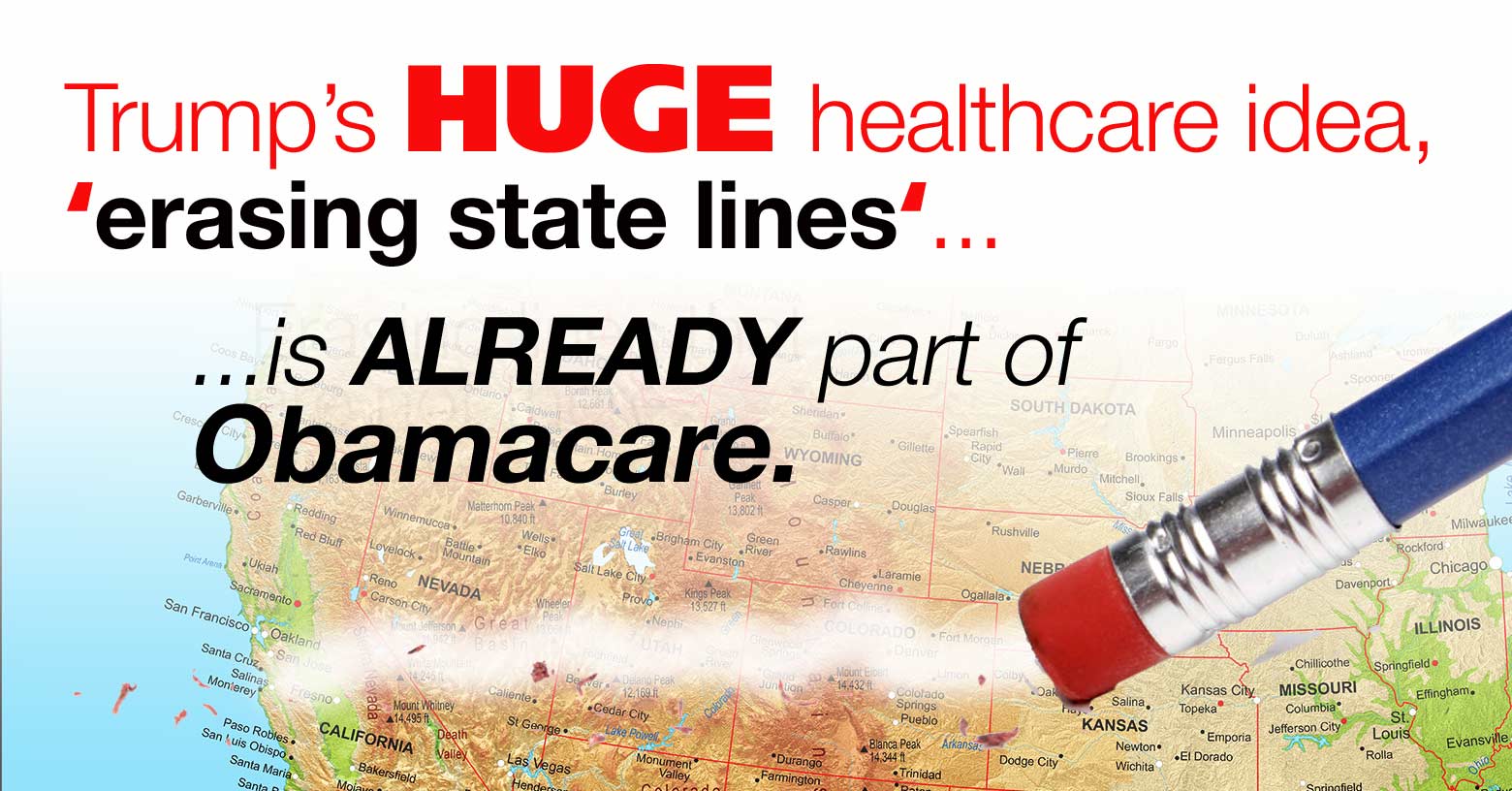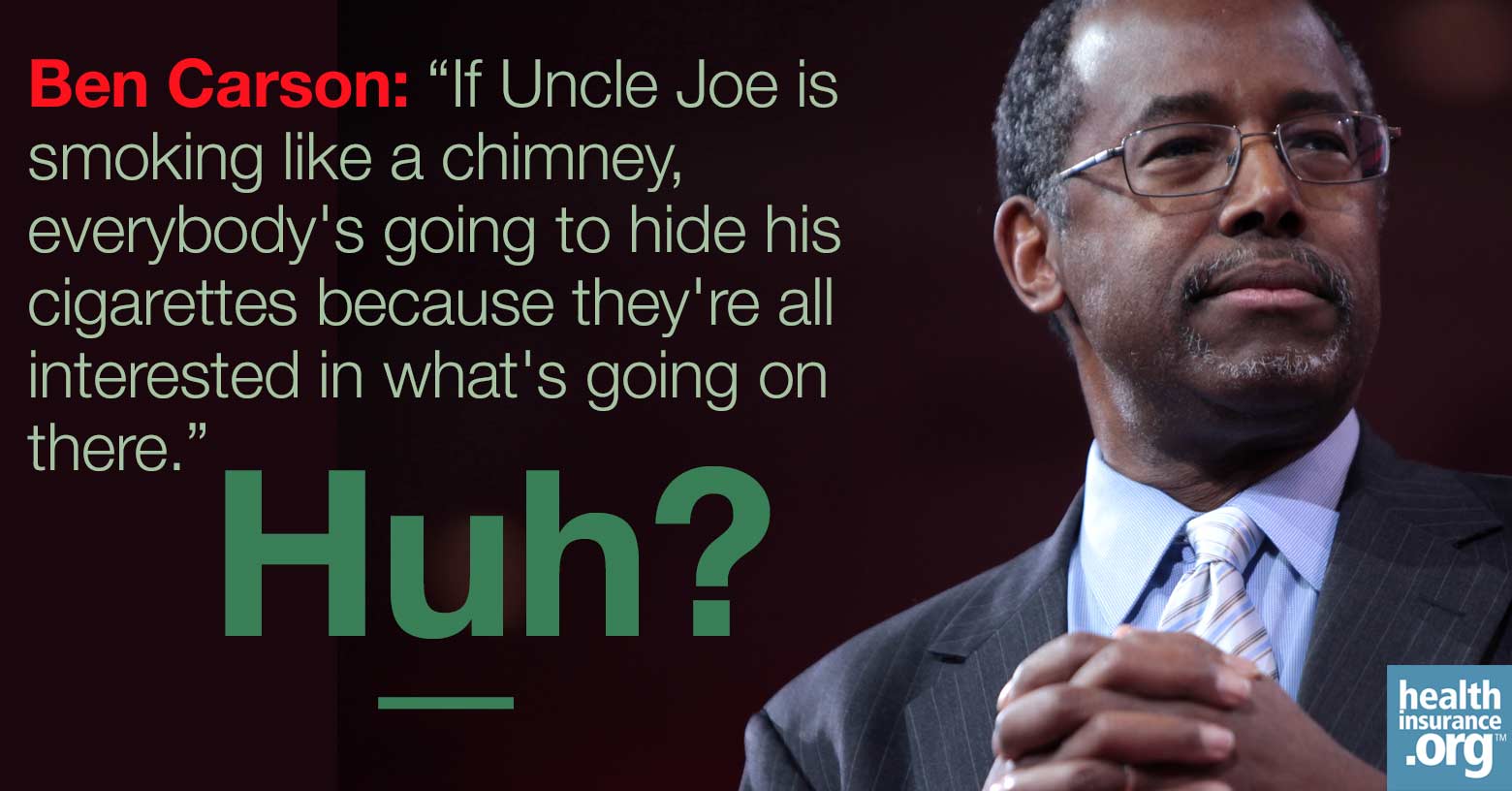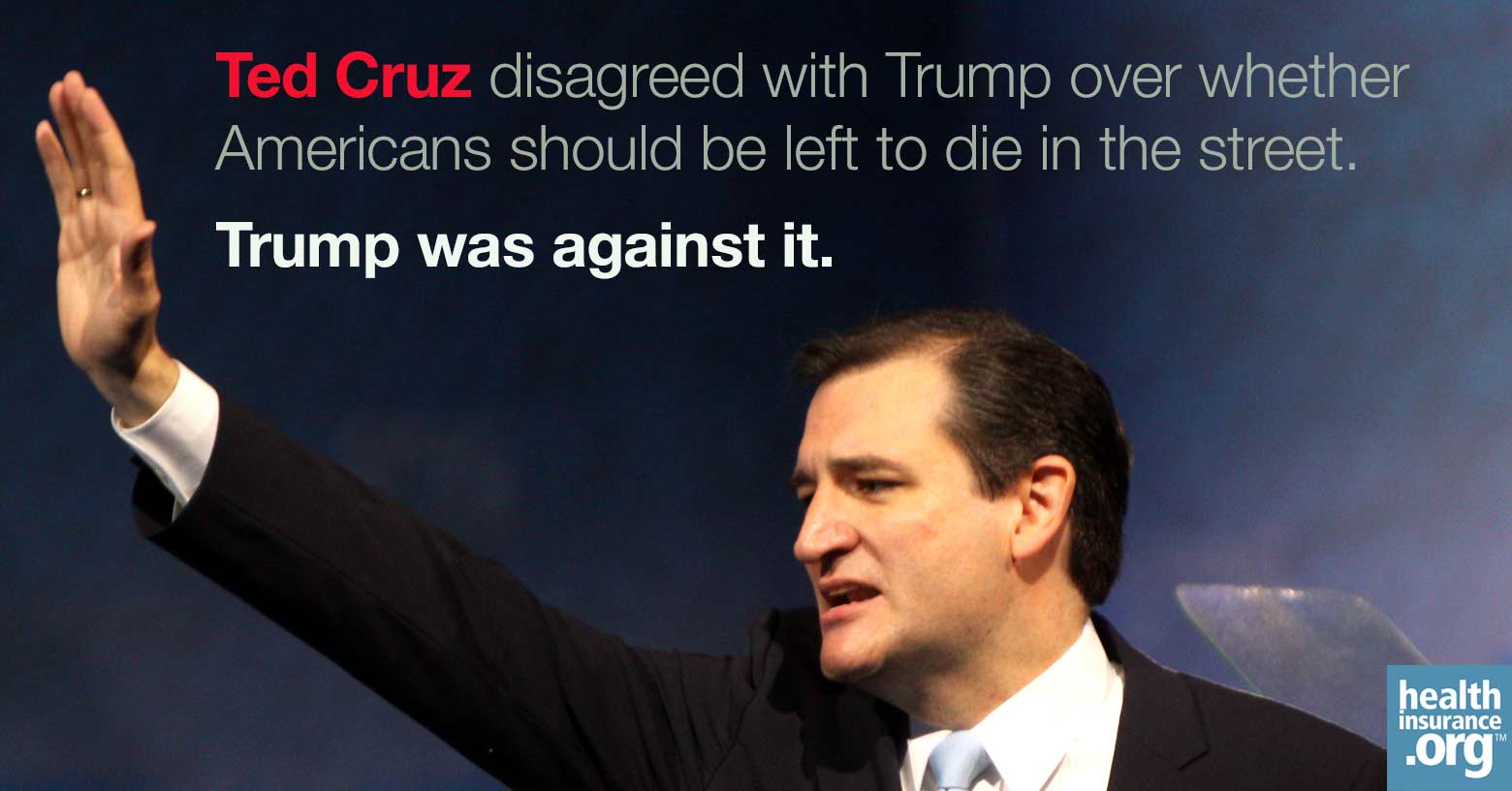
For most of the umpteen 2016 Presidential primary debates, there was virtual silence on the subject of the Affordable Care Act. There were a few mentions on the Democratic side, but on the Republican side ... crickets. This was particularly stunning given that "Obamacare" had spent nearly six years being the single most despised policy of President Obama by the Republican Party, so hated by the GOP that they voted to repeal it over 60 times. And yet, when it came time for the GOP debates ... there was little mention of the law.
Well that was then; this is now. Discussion of the ACA, and where to go next with healthcare policy in America, has heated up tremendously on the Democratic side of the aisle, as Hillary Clinton and Bernie Sanders slug it out over whether we should stay the course by improving and expanding the ACA to achieve universal coverage, or shift to comprehensive Single Payer healthcare for everyone.

In the most recent Republican debates, Obamacare has also finally returned to the front lines, but from a slightly different ... or, shall we say, a slightly less factually accurate or utterly ungrounded in reality kind of way.
Of course, every one of the remaining candidates still says they want to repeal the ACA, but trying to decipher some of their logic or reasoning is, as always, a bit on the difficult side. Last night's GOP Debate on CNN was a case study in ACA derp. To give you an idea, even the Closed Captioning service pretty much gave up trying partway through the event.
Anyway, all five remaining candidates shot their mouths off about the ACA and healthcare policy (or whatever passes for "policy" in Trump's head). I've cut out a lot of the "unintelligible yelling" in the exchanges below:
Rubio on subsidies ...
BLITZER: All of you want to repeal and replace Obamacare, so let's talk about your plans, specific plans to replace it.
BASH: Senator Rubio, you said yesterday, right here in Houston, that Mr. Trump thinks part of Obamacare is pretty good. So, he says he is going to repeal Obamacare. Are you saying that you're worried he won't?
RUBIO: The individual mandate. He said he likes the individual mandate portion of it, which I don't believe that should be part of it. That should not remain there. I think here's what we need to replace it with.
We need to repeal Obamacare completely and replace it with a system that puts Americans in charge of their health care money again. If your employer wants to buy health insurance for you, they can continue to do so from any company in America they want to buy it from. Otherwise, your employers can provide you health care money, tax-free, not treated as income, and you can use that money only for health care, but you can use it to fund health care any way you want, fully fund a health savings account, the combination of a health savings account or a private plan from any company in any state in the country.
And if you don't have that, then you will have a refundable tax credit that provides you health care money to buy your own health care coverage. And that, I think, is a much better approach than Obamacare, which, by the way, isn't just bad for health care, it's bad for our economy. It is a health care law that is basically forcing companies to lay people off, cut people's hours, move people to part-time. It is not just a bad health care law, it is a job-killing law.
Where to begin? Well, for one thing, Rubio is basically keeping the "tax credits" part of the ACA (which obviously do cost the federal government billions of dollars) ... but would apparently get rid of all of the regulatory parts, which presumably means allowing insurance carriers to charge whatever the hell they want, to only cover whomever they wish and whatever types of healthcare services they want to and to kick people off their policies over minor technicalities on a whim.
... the individual mandate
Furthermore, according to none other than Michael Cannon, who is the chief anti-Obamacare guy (he was the architect of the infamous King v. Burwell case which nearly crippled the law last summer), Rubio's plan would actually effectively keep the individual mandate after all, in the form of a financial hostage (basically, buy insurance and you get the money; don't and we shoot your tax credit in the head).
... and ACA, the Great Job Killer
As for the ACA being "bad for the economy" and being a "job killer," this is, of course, utter nonsense; as Dan Diamond noted over at Forbes last summer:
It’s important to note: The overall economy has been marching upwards since March 2010 ... coincidentally, the month that the Affordable Care Act was signed into law. The private sector has gained 12.3 million jobs since the depths of the recession.
That rising tide has lifted all boats, including health care.
Since then, of course, the numbers are even more impressive; up nearly 14 million jobs as of the end of 2015.
Trump on the individual mandate ...
BASH: Mr. Trump, Senator Rubio just said that you support the individual mandate. Would you respond?
TRUMP: I just want to say, I agree with that 100 percent, except pre-existing conditions, I would absolutely get rid of Obamacare. We're going to have something much better, but pre-existing conditions, when I'm referring to that, and I was referring to that very strongly on the show with Anderson Cooper, I want to keep pre-existing conditions.
Just a note: I presume that Trump means that he wants to continue requiring insurance carriers to cover people with pre-existing conditions. At least I hope so.
... and selling across state lines
BASH: OK, so let's talk about pre-existing conditions. What the insurance companies say is that the only way that they can cover people is to have a mandate requiring everybody purchase health insurance. Are they wrong?
TRUMP: I think they're wrong 100 percent. What we need ... look, the insurance companies take care of the politicians. The insurance companies get what they want. We should have gotten rid of the lines around each state so we can have real competition. We thought that was gone, we thought those lines were going to be gone, so something happened at the last moment where Obamacare got approved, and all of that was thrown out the window.
But, we should have gotten rid of the borders, we should have gotten rid of the lines around the state so there's great competition. The insurance companies are making a fortune on every single thing they do ... We have to get rid of the lines around the states so that there's serious, serious competition ... And, you're going to see ... excuse me. You're going to see pre-existing conditions and everything else be part of it, but the price will be done, and the insurance companies can pay. Right now they're making a fortune.
Of course, no, the insurance companies aren't "making a fortune" on "every single thing they do"; some of them are losing hundreds of millions of dollars on the individual ACA exchanges, although some of those same companies are also making lots of money via other parts of the law, or via other divisions of their business.
BASH: But, just to be specific here, what you're saying is getting rid of the barriers between states, that is going to solve the problem ...
TRUMP: That's going to solve the problem. And, the insurance companies aren't going to say that, they want to keep it. They want to say ... they say whatever they have to say to keep it the way it is. I know the insurance companies, they're friends of mine. The top guys, they're friends of mine. I shouldn't tell you guys, you'll say it's terrible, I have a conflict of interest. They're friends of mine, there's some right in the audience. One of them was just waving to me, he was laughing and smiling. He's not laughing so much anymore. Hi.
Really, I don't think anyone has a clue what Trump was trying to say, as usual, including himself, although the "Hi!" at the end reminded me an awful lot of the introduction to Zaphod Beeblebrox from The Hitchhiker's Guide to the Galaxy:
To tremendous applause Zaphod Beeblebrox stepped out of the bubble, his orange sash blazing in the light. The President of the Galaxy had arrived. He waited for the applause to die down, then raised his hand in greeting. "Hi," he said.
Zaphod Beeblebrox would not be needing his set speech and he gently deflected the one being offered him by the spider. "Hi," he said again.
Trump and Rubio mix it up. (My head hurts.)
The exchange between Trump and Rubio was, to put it mildly, headache-inducing, so you'll forgive me if I cut out the absurd "did not!" "did too!" back and forth between them:
RUBIO: You may not be aware of this, Donald, because you don't follow this stuff very closely, but here's what happened. When they passed Obamacare they put a bailout fund in Obamacare ... they put a bailout fund in the law that would allow public money to be used, taxpayer money, to bail out companies when they lost money.
And, we led the effort and wiped out that bailout fund. The insurance companies are not in favor of me, they hate that. They're suing that now to get that bailout money put back in.
Ah, yes ... the infamous Risk Corridor Massacre ... which helped destroy a dozen CO-OP insurance carriers and at least one private company; helped kick 800,000 people off of their healthcare policies last fall; and will very likely end up with the "bailout money" still getting paid out to the carriers after all ... and, as a bonus, might end up costing the taxpayers an additional $2.5 billion on top of that, all thanks to Marco Rubio's "leading effort."
Ah yes ... selling across state lines
RUBIO: Here's what you didn't hear in that answer, and this is important guys, this is an important thing. What is your plan? I understand the lines around the state, whatever that means. This is not a game where you draw maps ...
TRUMP: I got to tell you, the biggest problem he's got is he really doesn't know about the lines. The biggest thing we've got, and the reason we've got no competition, is because we have lines around the state, and you have essentially ...
RUBIO: ... So, you're only thing is to get rid of the lines around the states. What else is part of your healthcare plan ...
TRUMP: ... You get rid of the lines, it brings in competition. So, instead of having one insurance company taking care of New York, or Texas, you'll have many. They'll compete, and it'll be a beautiful thing.
RUBIO: So, that's the only part of the plan? Just the lines?
TRUMP: The nice part of the plan ... you'll have many different plans. You'll have competition, you'll have so many different plans.
Rubio actually hit on a real point here, which is, of course, that Trump has no particular plan in mind. The only specific he gives is indeed "removing the lines around the state," which appears to refer to the tired old "LET INSURERS SELL POLICIES ACROSS STATE LINES!!" mantra, which the GOP has been touting as some sort of miracle cure-all for the healthcare insurance industry.
There's a few problems with this, of course; the first is that the ACA already allows insurance carriers to do exactly that, and has since the beginning of this year:
The little-known provision, found in section 1333 of the roughly 1,000-page Affordable Care Act, allows for states to create "health care choice compacts" permitting insurers to sell policies to consumers in any state participating in the compact, as long as they follow specific rules. Five states ... Georgia, Kentucky, Maine, Rhode Island and Wyoming ... already have enacted interstate compact statutes, according to the National Conference of State Legislatures.
... it's not surprising the idea has surfaced again during this election ... it's just not clear that the candidates know it's already part of Obamacare. In an August op-ed in Politico, Rubio wrote: "Americans should be able to purchase coverage across state lines so they can seek out affordable coverage regardless of where they live." In August's Fox News Republican debate, Trump said erasing state lines for insurance would result in "great plans."
The second problem is that the insurance carriers don't appear to really be all that interested in doing this anyway, other than in a very limited way. Larger insurers like UnitedHealthcare, Aetna and so forth have sold policies in multiple states already anyway; the only distinction is that the policies sold in each state have to conform to that state's regulatory rules and requirements. The difference between how the ACA allows "selling across state lines" and what the GOP wants, of course, has to do with seeking the lowest common denominator:
But while Republican proposals are similar to what is permitted by the Affordable Care Act, their versions ... as targeted attacks on the existing law ... likely would not be subject to the same regulatory requirements already in place under its umbrella, nor those the Department of Health and Human Services is supposed to finalize.
... Democrats, meanwhile, are concerned that selling insurance across state lines would drive healthier customers to states where coverage is less expensive, leaving other states with fewer healthy customers to balance the costs incurred by those who are sick.
Kasich on the mandate, Medicaid expansion ...
Then it was on to Ohio Governor John Kasich ...
BASH: Governor Kasich, you've said it is, quote, "UnAmerican to deny someone health insurance if they have a pre-existing condition." Would you leave the individual mandate in place requiring all Americans to purchase insurance?
KASICH: No, I wouldn't. And ... but that doesn't matter when it comes to the issue of pre-existing conditions. You don't want any American to lose their house, everything they've saved, because they get sick. Now, I think it is more complicated than what we've heard here tonight. We're actually running significant health reform in my state.
I would repeal Obamacare for a variety of reasons. I would take some of the federal resources, combine it with the freed-up Medicaid program, which I would send back to the states, and cover the people who are currently the working poor because we don't want to have tens of millions of Americans losing their health insurance.
And then we're driving towards total transparency. If any of you here ever get a hospital bill, it's easier to interpret the Dead Sea scrolls than to understand your hospital bill. The fact is what we need is transparency with hospitals and with the providers.
And I'll tell you what we will do. We are actually going to make payments to physicians and to hospitals who actually deliver healthcare with great quality at low prices. We actually are going to make the market work.
Kasich is in a bit of a bind here from a Republican perspective, because as the governor of Ohio, he not only successfully pushed the ACA's Medicaid expansion provision through, he also attempted to push through the one of the other major engines of the ACA: A state-based market exchange. Again, via Michael Cannon:
Kasich supported implementing an Exchange. As I explain in my next post, he was for an Exchange before he was against it:
In February 2011, shortly after he took office, Kasich’s position was:
We cannot let the insurance exchange default to federal control, so we are moving forward with the planning that is required to make the exchange work best for Ohio.
On July 14, 2011, Columbus Business First quoted Kasich as saying:
“I think an exchange is a good idea as well,” signaling Ohio will implement another big part of the federal law even as his state insurance director, Lt. Gov. Mary Taylor, has been publicly blasting it.
Again in July 2011, Kasich sent the same message to the Cleveland Plain Dealer:
Kasich says exchange is in the works…“We have to get in position for this because we don’t want the federal government coming in here and dictating an exchange,” Kasich said … So yes, Ohio, there almost certainly will be an Ohio-specific exchange.
Kasich also openly admitted that conservative Republicans have long supported having the individual mandate requirement which they now claim is such an evil, horrible thing now that a Democrat actually managed to make it work:
BASH: Governor, let me just go back to the original question about the individual mandate. In 1994 when you were in Congress, you proposed a plan requiring an individual mandate. So what changed?
KASICH: Well, Dana, the Heritage Foundation had this position as well. And when I look at it, I don't think it's tenable. And we don't need to do that.
... and incentives for providers
Kasich also made a pitch for financially rewarding doctors/hospitals which provide better healthcare results ...
KASICH: We will begin payments next year based on episodes that we have in our lives. If our primary care physicians keep us healthy for a year, with really high quality, guess what? They will get a financial reward.
Our primary care physicians need help. They need support. We're losing them. This will allow them to get a reward for doing a great job ...
... which is a great idea. In fact, it's such an awesomely good idea that it's already included as part of the Affordable Care Act:
One of the main ways the Affordable Care Act seeks to reduce health care costs is by encouraging doctors, hospitals and other health care providers to form networks that coordinate patient care and become eligible for bonuses when they deliver that care more efficiently.
The law takes a carrot-and-stick approach by encouraging the formation of accountable care organizations (ACOs) in the Medicare program. Providers make more if they keep their patients healthy. About 6 million Medicare beneficiaries are now in an ACO, and, combined with the private sector, at least 744 organizations have become ACOs since 2011. An estimated 23.5 million Americans are now being served by an ACO. You may even be in one and not know it.
Carson's plan? Ok. I'm not sure.
As a respected neurosurgeon with a lengthy medical career, you would think that Dr. Ben Carson would take concepts like "compassion" and "humanity" seriously ... but apparently you would be wrong:
BASH: Dr. Carson, you have dealt with the sickest of patients. You support covering pre-existing conditions. How would you change Obamacare, but maintain that coverage?
CARSON: Well, first of all, healthcare is not a right. But I do believe it is a responsibility for a responsible society, and we are that.
Huh. OK, so healthcare isn't a right, but apparently it's a societal responsibility. Got it.
I propose a system in which we use health empowerment accounts, which are like a health savings account with no bureaucrats. And we give it to everybody from birth until death. They can pass it on when they die. We pay for it with the same dollars that we pay for traditional healthcare with. We give people the ability to shift money within their health empowerment account within their family. So dad's $500 short, mom can give it to him or a cousin or uncle.
And it makes every family their own insurance carrier with no middle man. It gives you enormous flexibility. And also, you know, if Uncle Joe is smoking like a chimney, everybody's going to hide his cigarettes because they're all interested in what's going on there.
He rambles on for a bit, but as far as I can tell, Carson's plan amounts to, essentially, "throw a bunch of money at people, problem solved." I'm sure others can make more sense out of what he said than I could.
Cruz feels left out
Then it was on to the guy who already wasted $24 billion in taxpayer money by shutting down the federal government for two weeks in a vain protest against the ACA, Ted Cruz:
CRUZ: Wolf, Wolf, Wolf. Does everyone get to address Obamacare but me? It's kind of an issue I have a long history with. You know, this is another issue on which Donald and I have sharp disagreements. On Planned Parenthood, he thinks Planned Parenthood is wonderful. I would instruct the Department of Justice to investigate them and prosecute any and all criminal violations.
On Obamacare, both Donald and I say we want to end it, but for very different reasons. I want to end it because it goes too far, it's killed millions of jobs, and it's hurting people's health care. Donald wants to end it because he says it doesn't go nearly far enough. And what was amazing in that exchange that was missing is for decades Donald has been advocating socialized medicine.
Again with the "job killer" nonsense. He then gets into another "did not!" "did too!" back and forth with Trump over The Donald's previous support of socialized medicine (or single payer ... both Trump and Cruz have kind of played fast and loose with the terminology, which isn't that surprising). Thing is, Cruz is actually pretty much on target here: Trump has come out in favor of "socialized medicine," "single payer healthcare," "having the government pay for everyone's healthcare" and similar statements.
On the other hand, Trump's actual plans have never been more specific than "something terrific" and "we'll work something out," whatever that means, so I really wouldn't take anything that he says about it too seriously. The truth is that no one knows what the hell Trump would actually do when it comes to healthcare or anything else.
On letting people 'die in the streets'
Trump and Cruz then got into a rather surreal debate about whether or not it's OK to allow people to "die on the streets" (again, I've cut out some of the crosstalk here for "clarity," if you can call it that):
CRUZ: Did you say if you want people to die on the streets, if you don't support socialized health care, you have no heart.
TRUMP: Correct. I will not let people die on the streets if I'm president.
CRUZ: Have you said you're a liberal on health care?
TRUMP: If people ... my plan is very simple. I will not ... we're going to have private ... we are going to have health care, but I will not allow people to die on the sidewalks and the streets of our country if I'm president. You may let it and you may be fine with it ...
CRUZ: So does the government pay for everyone's health care?
TRUMP: Excuse me. We are going to take those people and those people are going to be serviced by doctors and hospitals. We're going to make great deals on it, but we're not going to let them die in the streets.
CRUZ: Who pays for it?
RUBIO: Well, can I just clarify something? This is a Republican debate, right? Because that attack about letting people die in the streets ...
TRUMP: Call it what you want, people are not going to be dying on the sidewalk.
So, there you have it, folks: Ted Cruz and Marco Rubio appear to feel that NOT wanting to let people die in the street is a terrible, liberal idea (which also brings to mind the infamous Ron Paul "Let Him Die!!" moment from a 2012 GOP primary debate).
Meanwhile, Donald Trump wants everyone to know that while he might consider shooting random people in the middle of 5th Avenue, he won't let them actually die after being shot, which I suppose should be comforting.
Charles Gaba is the founder of https://acasignups.net/, which has been live-tracking Obamacare enrollments since the exchanges launched in October 2013. His work has been cited by major publications from the Washington Post and Forbes to the New York Times as being the most reliable source available for up-to-date, accurate ACA enrollment data in the country.






